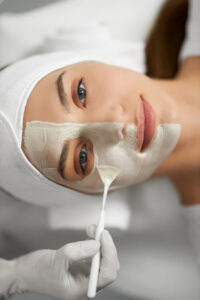7 Beauty Career Paths Every Aspiring Professional Should Know
Have you ever thought about turning your passion for beauty into a rewarding profession? Understanding beauty career paths can help you find the right fit for your skills and interests. The beauty industry offers many exciting opportunities for creative people who want to help others look and feel their best. From hair styling to skincare, there are many ways to build a successful career in this growing field.
The beauty industry is worth billions of dollars and continues to grow each year. New jobs are being created as people spend more time and money on personal care services. Whether you want to work in a salon, spa, or even start your own business, the options are wide open. This guide will walk you through seven popular beauty career paths and what it takes to get started in each one.

Hairdressers Training with Mannequin Head in Education Center. Professional female hairdresser teaching adult students haircutting technique.
Before you choose a beauty career path, it helps to know what each role involves. Some professionals work mainly with hair, while others focus on skin care or nails. Each area requires different training and skills. Some people prefer working directly with clients one-on-one, while others enjoy the creative challenge of working on photo shoots or special events.
The beauty industry has changed a lot in recent years. Technology and new techniques have opened up fresh career options that did not exist before. Social media has also created new jobs for beauty influencers and content creators. At the same time, traditional roles like hairstylist and esthetician remain in high demand. No matter which path you choose, you will find plenty of room to grow and develop your talents.
Understanding Beauty Industry Career Options
When you start exploring beauty career paths, you will quickly see how many choices you have. Each role in the beauty industry serves a different purpose and appeals to different personalities. Some careers let you work with your hands all day, creating beautiful looks for clients. Others involve more teaching, business management, or product sales. The key is finding what matches your natural talents and interests.
The beauty field is not just about making people look good. It is also about building relationships and helping clients feel confident. Many beauty professionals say the best part of their job is seeing a client smile after a service. This personal connection makes beauty careers meaningful for people who enjoy working with others.
Cosmetology Careers
Cosmetology is one of the most popular beauty career paths. Cosmetologists are trained to work with hair, skin, and nails. This broad training gives you flexibility to work in many different settings. You could work in a salon, spa, resort, or even on a cruise ship. Some cosmetologists specialize in one area, like hair coloring, while others offer a full range of services.
Hair stylists make up a large part of the cosmetology field. They cut, color, style, and treat hair for clients of all ages. A good hair stylist needs strong technical skills and an eye for what looks good on each person. You also need to stay current with trends and new techniques. Hair styling can be physically demanding because you stand most of the day, but many stylists love the creative freedom it offers.
Hair coloring has become a specialty all its own. Color specialists use advanced techniques like balayage, highlights, and fashion colors to create custom looks. This area of cosmetology requires deep knowledge of color theory and chemistry. Many stylists build their reputation on their color work and charge premium prices for complex color services.
Wedding hair and special event styling is another growing area. Stylists who specialize in bridal work often charge higher rates and work flexible hours. This can be a great way to build your own business. Many bridal stylists work on weekends and evenings when events take place.
Makeup artistry falls under the cosmetology umbrella in many states. Makeup artists work in salons, department stores, photo studios, and on film sets. Some makeup artists travel to clients for weddings and special occasions. This career requires an artistic eye and steady hands. You also need to understand different skin tones and face shapes to create flattering looks.
Esthetics Careers
Esthetics focuses specifically on skin care and facial treatments. Estheticians help clients improve their skin health through facials, chemical peels, microdermabrasion, and other treatments. If you love science and enjoy seeing visible results from your work, esthetics might be your ideal beauty career path.
Basic estheticians provide services like cleansing facials, extractions, and facial massage. They also recommend skin care products and create home care routines for clients. Most estheticians work in spas, salons, or dermatology offices. The job requires knowledge of skin types, conditions, and ingredients in skin care products.

Top view portrait of young attractive woman lying on procedure for improvements and rejuvenation skin in professional beauty salon. Concept of beauty procedure with cosmetics.
Advanced estheticians can perform more intensive treatments. These might include chemical peels, microdermabrasion, LED light therapy, and microneedling. Advanced treatments require additional training and certification. Estheticians with these skills often earn higher incomes because they can offer more services.
Medical esthetics is one of the fastest-growing beauty career paths. Medical estheticians work alongside dermatologists and plastic surgeons. They perform pre- and post-procedure care for patients having laser treatments, injectables, or surgical procedures. This career combines skin care knowledge with medical understanding. It can be very rewarding for people interested in both beauty and healthcare.
Nail Technology Careers
Nail technicians specialize in caring for hands, feet, and nails. This includes manicures, pedicures, nail art, and nail enhancements like acrylics and gels. Nail technology has grown into a major part of the beauty industry. Many people get regular nail services as part of their self-care routine.
Basic nail services include cutting, shaping, and polishing nails for both hands and feet. Nail techs also provide hand and foot massage, cuticle care, and skin treatments. These services help clients maintain healthy nails and soft skin. Many nail technicians work in dedicated nail salons, but you can also find them in full-service salons and spas.
Nail art has become very popular in recent years. Creative nail designs range from simple patterns to complex 3D artwork. Nail artists who can create trendy designs often build large social media followings. This can lead to opportunities working with brands or teaching workshops. If you have a steady hand and love detailed work, nail art could be your specialty.
Nail enhancements include acrylic nails, gel nails, and dip powder systems. These services require technical skill and knowledge of nail chemistry. Clients who want longer or stronger nails rely on nail techs who can create durable, natural-looking enhancements. This specialty can be very profitable because enhancement services typically cost more than basic manicures.
Barbering Careers
Barbering focuses on hair services for men and boys. Barbers are trained in classic cutting techniques, beard grooming, and straight razor shaves. The barbering industry has seen major growth in recent years as grooming services for men become more popular.
![Barber demonstrating classic cutting techniques and beard grooming]](/wp-content/uploads/2025/11/client-doing-hair-cut-barber-shop-salon-300x200.jpg)
Client doing hair cut at a barber shop salon
Traditional barbering skills include taper cuts, fades, and classic men’s hairstyles. Many modern barbers also offer beard shaping, beard coloring, and scalp treatments. The barbershop atmosphere tends to be more casual than a salon. Many clients develop long-term relationships with their barbers and visit regularly.
Beard grooming has become a specialty service. Many men now maintain styled beards and mustaches that require regular care. Barbers who are skilled in beard work can charge premium prices. Services include beard trimming, shaping, coloring, and conditioning treatments. Some barbers even make their own beard care products to sell to clients.
Mobile barbering is a growing trend. Some barbers bring their services directly to clients at home, in offices, or at events. This gives you flexibility and lets you set your own schedule. Mobile barbers need strong business skills along with their technical abilities. You must manage your own bookings, supplies, and transportation.
Specialized Beauty Programs
Beyond the main beauty career paths, several specialized areas offer unique opportunities. These programs typically require additional training after you complete basic beauty education. Specializing can help you stand out in the job market and potentially earn higher income.
Permanent makeup artists use tattooing techniques to create lasting eyebrow, eyeliner, and lip color. This field combines artistry with precision. Clients include people who want to save time on daily makeup application or those who have medical conditions affecting their appearance. This specialty requires steady hands, an eye for symmetry, and knowledge of color theory.
Lash and brow specialists focus on enhancing eyes through services like lash extensions, lash lifts, brow lamination, and brow tinting. These services have become very popular. Many specialists build busy practices doing only lash and brow work. The attention to detail required makes this a good fit for people who enjoy meticulous work.
Electrologists perform permanent hair removal using electrical current. This career requires specialized training and certification. Electrology can be very rewarding because you help clients solve problems that affect their confidence. The work is detail-oriented and requires excellent hand-eye coordination.
Educational Requirements for Beauty Professionals
Most beauty career paths require formal training at a licensed beauty school. The training hours vary by state and by program. Understanding these requirements helps you plan your education and career timeline.
Cosmetology programs typically require 1,000 to 1,600 hours of training depending on your state. The program covers hair services, basic skin care, nail care, and business practices. You learn through classroom instruction and hands-on practice with real clients. Most students complete cosmetology school in less than a year if they attend full-time.
Esthetics programs are usually shorter than cosmetology programs. Most states require 500 to 750 hours for basic esthetics licensure. Advanced esthetics may require additional hours. Students learn about skin anatomy, facial techniques, hair removal, makeup application, and product knowledge. Many people choose esthetics because the shorter program length means you can start working sooner.
Nail technology programs are among the shortest in the beauty field. Most states require 300 to 600 hours of training. Students learn manicure and pedicure techniques, nail enhancement systems, nail art, and salon safety. Some nail technicians later add additional certifications in specialized techniques.

Young woman teaching students in makeup school
Barbering programs usually require 1,000 to 1,500 hours depending on state requirements. Training covers men’s hair cutting, beard grooming, straight razor techniques, and business skills. Some states have separate barbering licenses, while others allow cosmetologists to perform barbering services.
All beauty professionals must pass state licensing exams. The exams include both written and practical sections. The written test covers theory, safety, and state laws. The practical exam requires you to demonstrate your skills on a live model. Passing these exams shows you can work safely and competently.
Continuing education is important in all beauty career paths. Techniques and trends change constantly. Many professionals take workshops and classes throughout their careers to learn new skills. Some states also require continuing education hours to renew your license. Staying current keeps you competitive and gives you more services to offer clients.
Financial aid may be available to help cover beauty school costs. Many schools offer payment plans and can help you apply for federal student aid. Some students also use scholarships specifically for beauty education. It helps to research your options early in the application process.
Skills That Make Successful Beauty Professionals
Technical skills are just the starting point for a successful beauty career. You also need people skills, business sense, and creativity. The most successful beauty professionals develop a well-rounded skill set that goes beyond their hands-on training.
Communication skills are critical in beauty career paths. You must understand what clients want and explain what you recommend. Many service problems happen because of miscommunication. Learning to listen carefully and ask the right questions will set you apart. You also need to manage expectations and handle difficult situations with grace.
Physical stamina matters in beauty careers. Most roles require standing for long periods. You use your hands constantly for detailed work. Taking care of your body through stretching, exercise, and proper posture helps prevent injuries. Many beauty professionals develop wrist, back, or foot problems if they do not pay attention to their physical health.

Creativity keeps your work interesting and helps you stand out. Clients come to you for fresh ideas and on-trend looks. Following beauty influencers, attending trade shows, and practicing new techniques keeps your creativity sharp. The beauty industry rewards people who can put their own spin on current trends.
Business skills become more important as you advance in your career. Even if you work for someone else, you need to manage your schedule, track your income, and market your services. If you want to own your own salon or work independently, you need to understand pricing, taxes, insurance, and basic accounting. Many beauty schools now include business training in their programs.
Time management helps you serve more clients and reduce stress. You need to estimate how long services take and schedule appointments efficiently. Running late frustrates clients and throws off your whole day. Successful beauty professionals learn to work at a good pace without rushing or making clients feel hurried.
Customer service skills turn one-time visitors into loyal regular clients. This includes remembering details about clients, following up after services, and making everyone feel welcome. Small touches like offering refreshments or remembering a client’s preferences make a big difference. Many beauty professionals say their regular clients become like friends.
Career Growth Opportunities in Beauty
The beauty industry offers many paths for advancement. You do not have to do the same job forever. As you gain experience, new opportunities open up.
Salon or spa ownership is a common goal for experienced beauty professionals. Owning your own business gives you control over your schedule, services, and income. It also comes with added responsibilities like managing staff, paying bills, and handling marketing. Many successful salon owners started by renting a booth or chair before opening their own location.
Education and training roles appeal to beauty professionals who enjoy teaching. Beauty schools need qualified instructors who can train the next generation. Most states require instructors to have several years of work experience and an instructor license. Teaching can be very rewarding and often offers more regular hours than service work.
Product sales and brand representation offer different types of beauty careers. Companies hire beauty professionals to demonstrate products, train salon staff, and represent their brands. These roles often involve travel and require strong presentation skills. Some people enjoy the variety this type of work brings compared to working in one location.
Platform artists and competition stylists focus on showcasing advanced techniques. They perform demonstrations at beauty shows and trade events. Some also compete in styling competitions. This career path requires exceptional technical skills and stage presence. It can lead to opportunities in education, product development, or media work.
Social media and content creation have opened new beauty career paths. Beauty influencers share tutorials, product reviews, and tips with online audiences. Some build large enough followings to work with brands or sell their own products. This requires skills in photography, video editing, and social media marketing along with your beauty knowledge.
Freelance and mobile beauty services appeal to people who want maximum flexibility. Freelancers work on their own terms, choosing their clients and setting their rates. You might specialize in wedding services, special events, or regular house calls. This path requires strong business skills and self-motivation. Many freelancers enjoy the freedom but miss the social aspect of working in a salon.
Getting Started in Your Beauty Career
Choosing your path is the first step toward a beauty career. Think about what aspects of beauty work excite you most. Do you love the chemistry of hair color? The science of skin care? The artistry of makeup? Your natural interests will guide you toward the right program.
Research schools in your area that offer your chosen program. Look for schools with good reputations, experienced instructors, and modern facilities. Many schools offer tours where you can see the training environment and meet staff. This helps you get a feel for whether the school is a good fit.
Consider the practical aspects of beauty school. Can you attend full-time or do you need a part-time schedule? What are the total costs including supplies and licensing fees? How long will it take to complete the program? These questions help you plan realistically.
Talk to people already working in your chosen field. Most beauty professionals are happy to share their experiences. Ask about their favorite and least favorite parts of the job. Find out what they wish they had known when they started. This insider perspective can be very valuable.

Plan for your licensing exam from the start. Study throughout your program rather than cramming at the end. Many schools offer exam prep courses or study groups. The licensing exam can feel stressful, but thorough preparation helps you pass on your first try.
Start building your professional network while in school. Connect with classmates, instructors, and visiting professionals. Attend beauty industry events when possible. Many job opportunities come through personal connections. Your classmates may become future colleagues or business partners.
Think about your first job strategically. Some new professionals want to work in busy salons where they can learn from experienced stylists. Others prefer smaller, quieter environments where they can build confidence. Both approaches have value. The important thing is finding a workplace where you can continue learning and developing your skills.
Set goals for your beauty career. Where do you want to be in one year? Five years? Ten years? Having clear goals helps you make decisions about training, jobs, and specializations. Your goals may change over time, and that is okay. The beauty industry offers enough variety that you can adjust your path as you grow.
Start Your Journey Today
The beauty industry welcomes people from all backgrounds who share a passion for helping others look and feel their best. Whether you are fresh out of high school, changing careers, or looking to expand your skills, beauty career paths offer something for everyone. The combination of creativity, personal connection, and practical skills makes this field uniquely rewarding.
Each of the seven beauty career paths we covered offers its own advantages. Cosmetology provides the broadest foundation and most flexibility. Esthetics appeals to people interested in skin science and health. Nail technology offers a focused specialty that can be learned relatively quickly. Barbering has strong growth potential as men’s grooming continues to expand. Specialized programs let you develop unique expertise.
Success in the beauty industry comes from combining technical skills with people skills and business sense. The best professionals never stop learning and growing. They stay current with trends, invest in continuing education, and build strong relationships with clients. They also take care of their own health and wellbeing so they can sustain long careers.
Your beauty career path starts with the first step of researching schools and programs. Take time to explore your options and find the right fit for your goals and lifestyle. Visit schools, talk to professionals, and imagine yourself working in different roles. The clarity you gain now will help you choose wisely and commit fully to your training.
The beauty industry needs talented, passionate professionals. If you love the idea of using your creativity to make people feel confident and beautiful, you are already on the right track. With proper training, dedication, and a willingness to keep learning, you can build a fulfilling career doing work you love. Your future in the beauty industry awaits.

